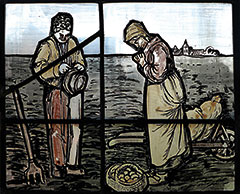Don’t Forget to Give Thanks
COVER STORY – THANKSGIVING
“Oh, that men would give thanks to the LORD for His goodness, and for His wonderful works to the children of men! Let them sacrifice the sacrifices of thanksgiving, and declare His works with rejoicing.” (Psalm 107:21-22)
 “Oh, give thanks to the Lord, for He is good! For His mercy endures forever.”
“Oh, give thanks to the Lord, for He is good! For His mercy endures forever.”
This prayer, drawn from the Psalms, has been a favorite of many a Christian down through the years. As believers have called to mind the Lord’s generosity in providing so many good things to eat and drink, they have united their hearts with the psalmist’s in exclaiming: “Thank You, Lord!” At this time of year we’re especially mindful of the Lord’s mercy. How lavishly our Thanksgiving tables are spread with a veritable smorgasbord of delicacies from His gracious hand! “Turkey and all the fixings,” as they say.
As children of God we know that we have reason to thank our heavenly Father for His cornucopia of blessings not just on a single day towards the end of November, but each day of our lives. In the verse quoted above from Psalm 107 we’re encouraged to do just that. Four times the psalmist’s call rings out: “Oh, that men would give thanks to the LORD for His goodness, and for His wonderful works to the children of men!” (verses 8,15,21,31) We might wonder why he made a point of repeating this thought. He did so undoubtedly for emphasis, because he knew God’s children need this reminder again and again. Aren’t we inclined to take God’s blessings for granted? Isn’t the temptation strong (especially for those living in an affluent culture) to forget that “every good gift and every perfect gift is from above, and comes down from the Father of lights” (James 1:17) and to begin thinking that the material benefits we enjoy are the product of our own doings and labor? (see Deuteronomy 8:11-17) The result of such misguided thinking is that we may neglect to lift our hearts in praise to the One from whom our blessings flow.Don’t Forget to Give Thanks












